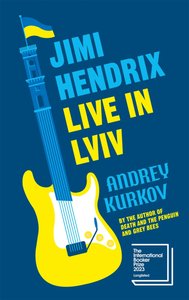Andrey Kurkov, The Milkman in the Night (2009/11)
 Ten years on from the English-language publication of his debut, Death and the Penguin, comes Andrey Kurkov’s ninth book. The Milkman in the Night (translated from the Russian by Amanda Love Darragh) tells of three main characters whose lives intertwine in contemporary Kiev: Dmitry, the airport sniffer-dog handler who finds a case of ampoules containing a substance which has a remarkable effect on those who consume it; Irina, the single mother who sells her breast milk for a living; and Semyon, who finds that he has been out walking at night with no memory of doing so – and his business partner’s report from monitoring those journeys only leaves Semyon with more questions.
Ten years on from the English-language publication of his debut, Death and the Penguin, comes Andrey Kurkov’s ninth book. The Milkman in the Night (translated from the Russian by Amanda Love Darragh) tells of three main characters whose lives intertwine in contemporary Kiev: Dmitry, the airport sniffer-dog handler who finds a case of ampoules containing a substance which has a remarkable effect on those who consume it; Irina, the single mother who sells her breast milk for a living; and Semyon, who finds that he has been out walking at night with no memory of doing so – and his business partner’s report from monitoring those journeys only leaves Semyon with more questions.
For all the strangeness in its pages (and it’s by no means confined to the three protagonists), The Milkman in the Night has a strongly deadpan quality, both in the reactions of its characters to events, and in Kurkov’s prose. This turns out to be both a strength and a weakness of the novel: on the one hand, it creates an effective contrast which draws the reader in by making one want to know just where the book’s going next; on the other, it puts a certain distance between reader and characters which makes engaging emotionally that bit more difficult. But the structure works well, a series of short chapters that shift between viewpoints, creating a narrative skein that gradually reveals the connections between characters, and a truth that may or may not be fully uncovered.
This review first appeared at We Love This Book.
Guardian interview with Andrey Kurkov.
Reviews elsewhere: Marina Lewycka for the Financial Times; Tom Adair for The Scotsman.
Hugh Cornwell, Window on the World (2011)
 The first novel by singer-songwriter (and former Stranglers frontman) Hugh Cornwell is the story of Jamie Thornberry, a botanical writer who becomes infatuated with an artist named Katherine Gaunt whom he meets at an exhibition. He buys one of her paintings at auction; hears of another one in Paris and buys that; then tracks down a third to a Paris apartment, and takes it for himself. Jamie becomes determined to collect Katherine’s works; his methods for doing so grow more extreme – and he may be just as obsessed with the artist herself.
The first novel by singer-songwriter (and former Stranglers frontman) Hugh Cornwell is the story of Jamie Thornberry, a botanical writer who becomes infatuated with an artist named Katherine Gaunt whom he meets at an exhibition. He buys one of her paintings at auction; hears of another one in Paris and buys that; then tracks down a third to a Paris apartment, and takes it for himself. Jamie becomes determined to collect Katherine’s works; his methods for doing so grow more extreme – and he may be just as obsessed with the artist herself.
Window on the World is a fine character study. Cornwell initially portrays Jamie as reasonable enough; even when he steals a painting, we can rationalise it as an aberration brought on by the sudden intensity of his love for Katherine’s work (and even the protagonist seems to recognise he’s done something wrong and out of character). But, as time goes on, it becomes increasingly difficult for us to explain Jamie’s action’s away like that – and there’s a brilliant perceptual shift towards the end which reveals that Jamie may not be such a reliable narrator after all. It’s the kind of narrative move that makes one want to go back to the beginning and re-read to see what other clues there were, what other stories were told without our realising.
Hugh Cornwell’s website
Extract fromWindow on the World [PDF]
Quartet Books
Joe Dunthorne, Submarine (2008)
 I enjoyed hearing Joe Dunthorne read from his second novel, Wild Abandon, earlier this year; but I’ve decided to start with his debut before going on to that newer book. So: Submarine is narrated by Oliver Tate, fifteen years of age in mid-1990s Swansea. He’s discovering long words and girls (in particular Jordana Bevan, who likes to set fire to things, and came on to Oliver at least as much as he did to her). But Oliver senses problems at home, because he’s found an empty bottle of antidepressants in his father’s waste-bin, and is suspicious about his mother’s going on a retreat where an old (male) friend will be teaching capoeira.
I enjoyed hearing Joe Dunthorne read from his second novel, Wild Abandon, earlier this year; but I’ve decided to start with his debut before going on to that newer book. So: Submarine is narrated by Oliver Tate, fifteen years of age in mid-1990s Swansea. He’s discovering long words and girls (in particular Jordana Bevan, who likes to set fire to things, and came on to Oliver at least as much as he did to her). But Oliver senses problems at home, because he’s found an empty bottle of antidepressants in his father’s waste-bin, and is suspicious about his mother’s going on a retreat where an old (male) friend will be teaching capoeira.
I warmed to Dunthorne’s prose style and observation from the very beginning, when Oliver describes a modem as ‘playing bad jazz’. The narrative voice as a whole rings true, the fancy words and facts peppered throughout symbolic of a young man who’s smart but still unsure of his place in the world (we see this particularly strikingly when Jordana tells Oliver that her mother has a brain tumour; all his words are no help in reacting appropriately).
That sense of being only halfway there is also present in how Oliver reacts to events in his life; he instinctively understands something of what’s going on around him, but doesn’t grasp all the subtleties, and that means things don’t always work out as well as he’d like. Now I really want to see the film of Submarine, because I can imagine some of these scenes playing out really well on screen, such as when Oliver goes to the retreat to find out what his mum is really up to, or when he tries to ‘help’ with Jordana’s dog. All in all, this is a great debut; and now I’m looking forward to Wild Abandon even more.
Joe Dunthorne’s website
Wales Online video interview with Dunthorne
Reviews elsewhere: Chasing Bawa; Tim Adams for the Observer.
Like this:
Like Loading...



 Ten years on from the English-language publication of his debut, Death and the Penguin, comes Andrey Kurkov’s ninth book. The Milkman in the Night (translated from the Russian by Amanda Love Darragh) tells of three main characters whose lives intertwine in contemporary Kiev: Dmitry, the airport sniffer-dog handler who finds a case of ampoules containing a substance which has a remarkable effect on those who consume it; Irina, the single mother who sells her breast milk for a living; and Semyon, who finds that he has been out walking at night with no memory of doing so – and his business partner’s report from monitoring those journeys only leaves Semyon with more questions.
Ten years on from the English-language publication of his debut, Death and the Penguin, comes Andrey Kurkov’s ninth book. The Milkman in the Night (translated from the Russian by Amanda Love Darragh) tells of three main characters whose lives intertwine in contemporary Kiev: Dmitry, the airport sniffer-dog handler who finds a case of ampoules containing a substance which has a remarkable effect on those who consume it; Irina, the single mother who sells her breast milk for a living; and Semyon, who finds that he has been out walking at night with no memory of doing so – and his business partner’s report from monitoring those journeys only leaves Semyon with more questions. The first novel by singer-songwriter (and former Stranglers frontman) Hugh Cornwell is the story of Jamie Thornberry, a botanical writer who becomes infatuated with an artist named Katherine Gaunt whom he meets at an exhibition. He buys one of her paintings at auction; hears of another one in Paris and buys that; then tracks down a third to a Paris apartment, and takes it for himself. Jamie becomes determined to collect Katherine’s works; his methods for doing so grow more extreme – and he may be just as obsessed with the artist herself.
The first novel by singer-songwriter (and former Stranglers frontman) Hugh Cornwell is the story of Jamie Thornberry, a botanical writer who becomes infatuated with an artist named Katherine Gaunt whom he meets at an exhibition. He buys one of her paintings at auction; hears of another one in Paris and buys that; then tracks down a third to a Paris apartment, and takes it for himself. Jamie becomes determined to collect Katherine’s works; his methods for doing so grow more extreme – and he may be just as obsessed with the artist herself. I enjoyed hearing Joe Dunthorne read from his second novel, Wild Abandon,
I enjoyed hearing Joe Dunthorne read from his second novel, Wild Abandon,
Recent Comments